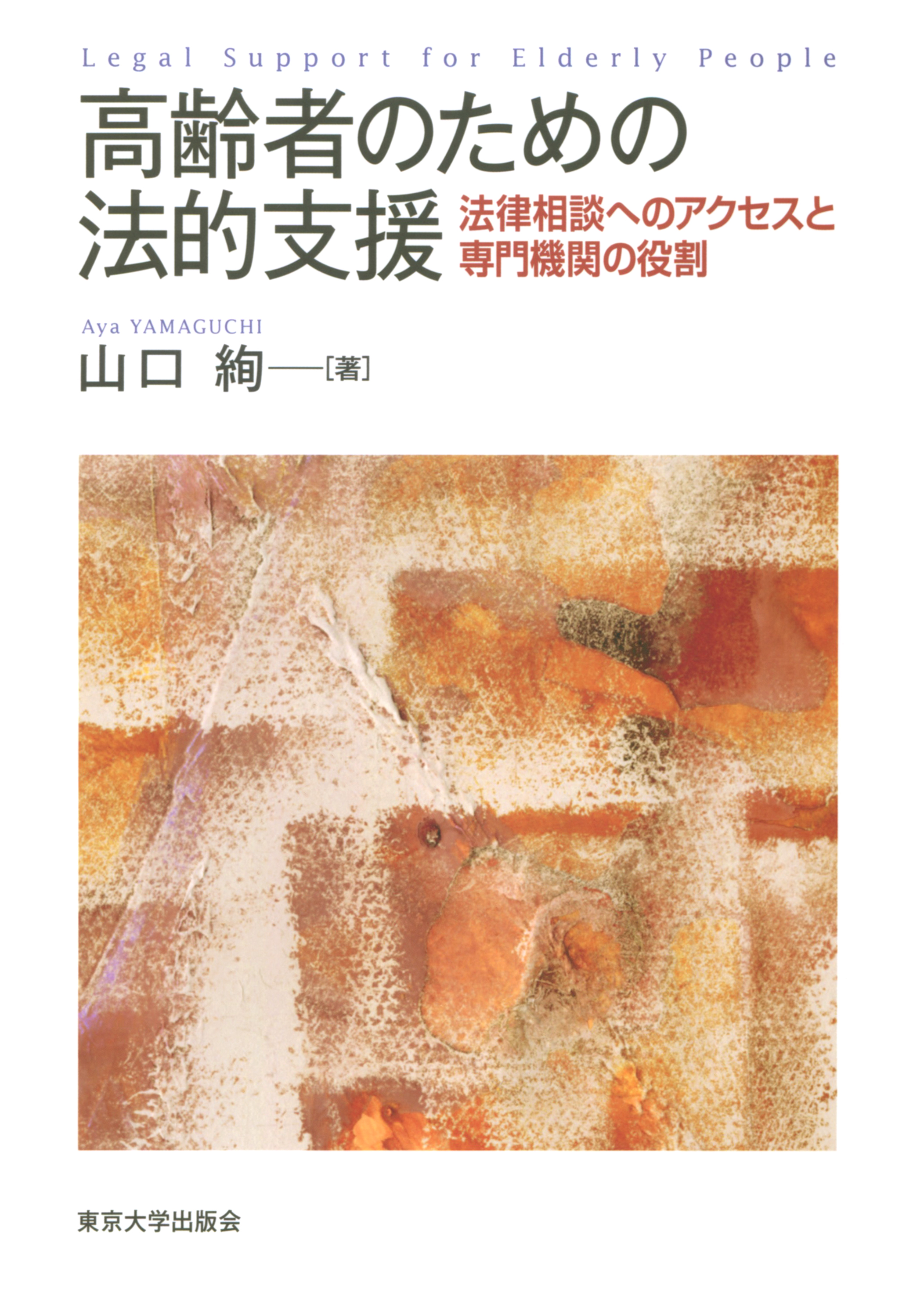
Title
Koreisha no tameno Hoteki Shien (Legal Support for Elderly People - Access to Legal Consultation and the Role of Specialized Agencies)
Size
256 pages, A5 format
Language
Japanese
Released
April 20, 2020
ISBN
978-4-13-036153-8
Published by
University of Tokyo Press
Book Info
See Book Availability at Library
Japanese Page
This book examined how elderly people gain access to legal consultation and attempted to identify the challenges faced in this process. Furthermore, the book discussed the holistic approach to improve their access.
As is commonly known, the proportion of Japanese population aged 65 years and above is nearly 30 percent. In order to overcome challenges in an aging society, the Japanese government reframes policies and provides support for elderly people in medical, nursing care, social welfare, and employment fields.
Despite these measures, elderly people and their family may face legal challenges such as inheritance, consumer fraud, and adult guardianship. For example, elderly people will be required to make difficult decisions regarding their wills or their family’s inheritance. Elderly people and their family also need to decide whether they will apply for adult guardianship or family trust when the elderly’s cognitive capacity is declined (or in preparation for that). Furthermore, if the elderly person does not have frequent contact with his/her family and neighbors, and has trouble with household budgets and cognitive capacity, his/her living and legal needs will not be recognized by the others.
Considering the situation described above, this book aims to examine how elderly people access legal consultation and the challenges in their access. Specifically, I conducted multiple surveys with elderly people, legal professionals, and administrative/social service agencies. Based on the results, this book analyzed factors associated with the elderly people’s access to legal consultation and the challenges in providing legal support for them.
In Chapter 1, this book explained the current situation of the aging Japanese society and discussed previous studies regarding access to justice, especially the elderly’s access to legal consultation.
Chapter 2 examined the troubles/problems faced by the elderly, their advice seeking behavior, and knowledge regarding legal services, based on the web and interview surveys.
By analyzing the interview data gathered from lawyers and judicial scriveners, Chapter 3 discussed the factors affecting the elderly’s access to legal consultation and the challenges of supporting elderly people.
Chapter 4 analyzed the interview data from administrative/social service agencies that established collaborative relationships with the Japan Legal Support Center. This chapter discussed the advantages and challenges of administrative/social service agencies mediating the elderly’s access to legal services.
Chapter 5 examined the holistic legal support approach for elderly people, based on the discussions in Chapters 1 to 4.
This book drew two conclusions. First, it is effective for administrative/social service agencies to mediate the most-needy elderly’s access to legal consultation. Second, in cases where the first approach cannot provide support, the legal system needs to start providing support at a younger age.
The focuses on a specific age group (i.e., elderly people), make this book unique in the field of access to justice literature. Furthermore, this book contributes to Elder Law research by empirically examining the challenges of providing legal support for elderly people. It is expected that this book will contribute to the policy/practical discussions regarding legal support for elderly people.
(Written by: YAMAGUCHI Aya / May 17, 2021)
Table of Contents
1. The current Japanese situation of an aging society
2. The birth and development of elder law
3. Legal problems faced by elderly people and the current situation of legal support
4. People involved in legal support for elderly people
5. Previous studies and research methods of this book
6. Term definitions
Chapter 2: The troubles/problems by elderly people and their advice seeking behavior—how did elderly people deal with their troubles or problems?
1. Introduction
2. Survey methods
3. The troubles/problems faced by elderly people and their advice seeking behavior
4. Short summary
Chapter 3: The legal professionals’ perceptions and practices—the role of legal professionals for improving access
1. Introduction
2. Survey methods
3. The elderly’s access to legal consultation and the role of legal professionals
4. Discussions
5. Short summary
Chapter 4: The functions of administrative/social service agencies—mediating the elderly’s access to legal consultation
1. Introduction
2. Survey methods
3. Facilitative/obstructive factors in the process through which administrative/social service agencies identify elderly people’s legal needs and mediate their access to legal services
4. The effects and challenges of the information service system
5. Short summary
Chapter5: Discussions for improving the elderly’s access to legal consultation
1. Introduction
2. An approach for improving access: collaboration between legal professionals and administrative/social service agencies
3. Policy challenges for providing more fulfilling legal support for elderly people
4. The contributions of this book
5. Future agenda



